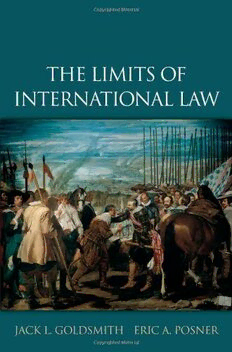
The Limits of International Law PDF
272 Pages·2005·0.855 MB·English
Most books are stored in the elastic cloud where traffic is expensive. For this reason, we have a limit on daily download.
Preview The Limits of International Law
Description:
International law is much debated and discussed, but poorly understood. Does international law matter, or do states regularly violate it with impunity? If international law is of no importance, then why do states devote so much energy to negotiating treaties and providing legal defenses for their actions? In turn, if international law does matter, why does it reflect the interests of powerful states, why does it change so often, and why are violations of international law usually not punished? In this book, Jack Goldsmith and Eric Posner argue that international law matters but that it is less powerful and less significant than public officials, legal experts, and the media believe. International law, they contend, is simply a product of states pursuing their interests on the international stage. It does not pull states towards compliance contrary to their interests, and the possibilities for what it can achieve are limited. It follows that many global problems are simply unsolvable. The book has important implications for debates about the role of international law in the foreign policy of the United States and other nations. The authors see international law as an instrument for advancing national policy, but one that is precarious and delicate, constantly changing in unpredictable ways based on non-legal changes in international politics. They believe that efforts to replace international politics with international law rest on unjustified optimism about international law's past accomplishments and present capacities.
See more
The list of books you might like
Most books are stored in the elastic cloud where traffic is expensive. For this reason, we have a limit on daily download.
